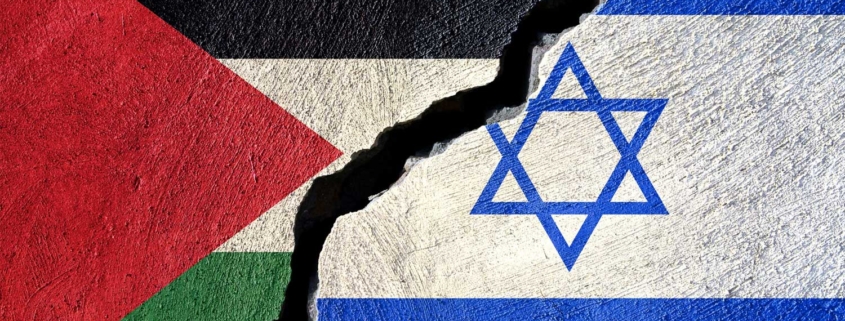Israel Under Attack
With the recent war in Israel, the clash between Arabs and Jews in the region is once again a hot button issue. While many onlookers on both sides continue to rail against one another, this time, the conflict has also spilled over into cities around the world, with anti-Semitic rhetoric and violence ticking up to even more dangerous levels than before. Given the abundance of misinformation, false accusations and questions surrounding this explosive topic, here are some facts about the tumultuous history of the holy land, and how this recent bout between Israel and the Palestinians got started.
What is Palestine, and who are the Palestinians?
In the 2nd century AD, the Romans crushed a Jewish revolt in the region of Judea, and then renamed the land Palestine in an attempt to separate the Jews’ identity from the Land. For almost 2,000 years, everyone living in the region—including Jews, Christians and Arabs—were referred to as Palestinians. Control of the land passed through several different kingdoms over the years, eventually being held by the Ottoman Empire from the 1500s until World War I.
Following World War I, Palestine was placed under British administration until just after World War II, when Britain intended to divide the land between its Jewish and Arab inhabitants as two separate states. This plan was accepted by the Jews but rejected by the Arabs, so in 1948, Israel declared herself to be an independent nation, and invited all Arabs currently living within her borders to peacefully be a part of the State of Israel as full and equal citizens. The other Arab countries surrounding the new nation immediately declared war, but Israel was victorious and ultimately retained control of much of the land. The areas of Gaza and the West Bank of the Jordan River were placed under the control of Egypt and Jordan, respectively.
During that war, many Arab residents of Israel fled their homes and were housed in camps in the neighboring Arab countries. After the war ended, those Arabs who had remained in Israel received full citizenship status, but those who had left as refugees no longer had a homeland. The neighboring countries refused to give them citizenship, and kept them relegated to camps with very poor living conditions, demanding that they be allowed to return to Israel.
Then, in 1967, Israel was once again attacked by her Arab neighbors. The Six-Day War ended quickly with a decisive Israeli victory, and Gaza and the West Bank, including East Jerusalem, were taken from Egypt and Jordan. Those regions are now under Israeli military control, but the Arab residents govern themselves autonomously and do not have Israeli citizenship. The term Palestinian is now used to refer to the families of those who fled Israel as refugees in 1948, as well as those living in the areas taken during the Six-Days War. Some Arabs with Israeli citizenship also consider themselves to be Palestinians.
What is the occupation of Palestine, and what do people mean when they advocate for a “Free Palestine”?
Though Israel has never been the aggressor in the wars fought against her, and did not set out to take land from her neighbors, there are those who consider Israel’s control over the conquered areas to be an occupation, and refer to Gaza and the West Bank as the occupied territories. While some claim that they only want to see these areas established as a free and independent Palestinian state, the underlying sentiment runs much deeper. A common chant among those calling for Palestinian liberation is, “From the River to the Sea, Palestine will be free.” In essence, this is a call to wipe Israel off the map, from the Jordan River to the Mediterranean Sea, and replace it with a Palestinian state.
Why doesn’t Israel just give the occupied territories to the Palestinians?
On multiple occasions, Israel has attempted to negotiate a two-state solution with the Palestinians, offering extensive areas of land in exchange for peace. However, all efforts have been refused, and no amount of concessions seem to be enough, as the Palestinian leaders continually made demands that would leave Israel’s borders indefensible. Palestinian terrorist attacks on Israel became a regular occurrence, including suicide and aerial bombings of innocent civilians, plowing vehicles through crowds of pedestrians, and launching incendiary devices into the air to create wildfires.
When negotiations came to a complete standstill, Israel attempted to unilaterally create peace by withdrawing completely from Gaza, leaving the Palestinians in the region with complete control. They removed all Jewish settlers from the area, demolishing their homes, and left no Jewish presence of any kind. In return, the people of Gaza promptly elected Hamas, an international terrorist organization, to establish their government. Since that time, Hamas has repeatedly used Gaza to launch bombs against Israeli cities, while leaving the Palestinian residents to live in poverty and despair.
How did the recent conflict get started? Why did I hear that Israeli police attacked peaceful Arab worshippers, and that Jews stole the homes of Arabs in Jerusalem?
The recent conflict began during the month of Ramadan, which is a holy month on the Muslim calendar. Because Jerusalem is considered a holy site, many Muslims came to the mosque on the Temple Mount to pray, but there were also many who came to instigate trouble. As Israeli police attempted to keep order among the huge crowds, they began to be pelted by stones, bottles, and other projectiles. The rioting intensified, and they responded with crowd control devices such as rubber bullets, tear gas and stun grenades.
In a separate incident, an ongoing legal dispute dating all the way back to the Six-Day War is taking place between a Jewish landowning company and a few Arab residents in an East Jerusalem neighborhood. The company intends to displace the current residents in order to build new housing units. Although both parties claim legal right to the land, lower courts recently found in favor of the Jewish owner, and the street has become a focal point for ongoing protests as further appeals are made.
These two situations served as a flashpoint to ignite rioting throughout Israel, and also gave Hamas justification to begin another assault against Israel. They indiscriminately launched over 4,000 rockets into Israeli territories, and Israel responded with precision strikes to take out Hamas rocket launchers and personnel.
Why were there so many more innocent civilian casualties among Palestinians as compared to Jewish casualties?
Although a huge number of rockets were launched by Hamas against innocent Israeli citizens, most of them either fell in unpopulated areas, or were intercepted by the Iron Dome, Israel’s advanced system to detect and destroy incoming rockets. Israelis also have bomb shelters readily available, and warning sirens to alert citizens to incoming rockets. On the other hand, instead of protecting the welfare of its own citizens, Hamas purposely launches its rockets from civilian areas, using their own people as human shields. The Israeli Defense Force uses precision strikes to take out military targets, but there are times when innocent lives are lost in the process. However, unlike Hamas, civilians are never purposely targeted, and the Israelis make every attempt to evacuate the area before destroying a target. Unfortunately, the Palestinian people have been taught to hate Israel with such passion that they will sometimes purposely remain in an area that is about to be bombed, knowing that their deaths can be used as propaganda against Israel.
Is anti-Zionism different from anti-Semitism? Why have anti-Semitic incidents risen dramatically across the globe since the recent conflict between Hamas and Israel?
Some claim that it is possible to hate and oppose Israel as a nation, but not hate Jewish people in general—to be anti-Zionist without being anti-Semitic. Yet the State of Israel is the only Jewish nation on the planet, and is home to almost half of world’s Jewish population. As such, hatred of Israel is by definition hatred of Jewish people. How can one desire to eradicate the homeland of half the Jewish people in the world without being anti-Semitic? And recent events prove that the anti-Zionist spirit is a thin veneer, covering a deeper hatred of Jewish people. Over the last several weeks, as anti-Zionists protests were held in cities around the world, anti-Semitic incidents have also skyrocketed: synagogues and schools have been defaced, horrible insults have been screamed at Jewish families, Jewish businesses have been vandalized, and men have been hunted down and beaten in the streets for the simple crime of wearing a kippah.
Did this post bless you?
♥
To those who love Yeshua and know the Scriptures, this hatred should come as no surprise. The Jewish people are chosen by God, and He promises to preserve them as a nation forever (Jeremiah 31:36). What greater victory could the evil one achieve than to make God a liar and destroy Israel, the apple of His eye? Over and over throughout history, we have seen the spirit of anti-Semitism rise up to annihilate Israel—and over and over we have seen God uphold His promise to protect them and preserve a remnant.
But the true anti-Zionists will not rest until they have eliminated every Jew—everywhere.







Leave a Reply
Want to join the discussion?Feel free to contribute!